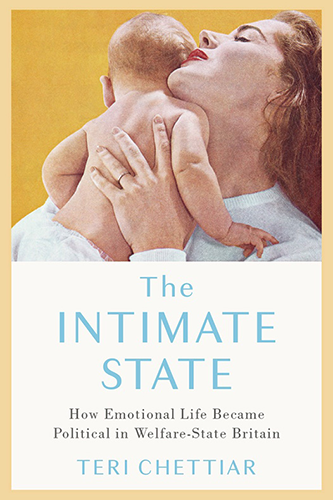

In the decades following World War II, the intimate emotional life of families took on unprecedented social and political value in Western democracies. History professor Teri Chettiar looks at how the British government prioritized emotional well-being and viewed it as necessary for a stable democracy in her new book “The Intimate State: How Emotional Life Became Political in Welfare-State Britain.”
Chettiar said several factors led to emotional health becoming a subject of great political importance.
The postwar period was a time of heightened concern for the future of Great Britain and its children, many of whom had been forced from their homes and lost one or both parents during the war. People wondered what would become of those children and how their trauma would affect their emotional and psychological development, Chettiar said.
Alongside these concerns were questions of whether the rise of support for Nazism in Germany could be explained psychologically. Many of these questions focused specifically on whether Nazi supporters had damaged psyches that resulted from growing up in excessively patriarchal families that lacked affection and emotional connection. The war was seen as having psychological causes: Entire populations were thought to suffer from the long-term emotional effects of family dysfunction, she wrote.

After the war, the architects of Britain’s welfare state were motivated by recent psychiatric ideas supporting the creation of mentally and emotionally healthy democratic citizens that pointed to stable family relationships as the key, Chettiar said. The traditional nuclear family was presented as ideal from a psychological perspective, and a close, nurturing mother-child relationship was seen as especially crucial for healthy psychological development. That, in turn, was widely believed to be the basis for responsible citizenship and a stable democracy.
At the time, Britain was nationalizing health and social services, making them available to everyone free of charge. The welfare state offered marriage counseling, psychiatric treatment for postpartum mental illness, and family and group therapies, built on the experience of offering group therapy to treat soldiers with mental health disorders during WWII, Chettiar said.
However, the government’s goal of promoting healthy family relationships didn’t recognize the realities of many families. The ideal of traditional family life assumed both whiteness and middle-class status, and a traditional role for women as homemakers, mothers and emotional providers. Single parents, women struggling with motherhood, and unhappily married couples were seen as emotionally immature and perpetuating a cycle of unhealthy relationships, Chettiar said.
“A lot of people were left out of that ideal. The nuclear family was a minority. This middle-class arrangement was not what most people were experiencing,” she said.
Chettiar described how, in the 1960s, those not living in a traditional nuclear family also appropriated the ideal of emotional health rooted in close, intimate relationships for their causes. For example, LGBTQ+ activists used it to champion homosexual rights, widen access to such relationships, and warn against the damaging psychological effects of social oppression. Sexual reformers appealed to this ideal to advocate for teenagers’ access to birth control and also make a case for lowering the age of sexual consent.
During the social reforms of the 1960s and 1970s, there was a shift from concern for experiencing emotional intimacy in the context of a long-lasting family relationship to experiencing it in friendships and nonmonogamous relationships, Chettiar said.
“We see more challenges to nuclear families, but the perceived promises of intimate relationships become even more widely believed. The range of relationships where intimacy could be experienced widened. The book tracks how close, intimate relationships became widely prioritized and valued. People wanted intimacy and thought that they needed these kinds of relationships to experience mental and emotional health,” she said.
Chettiar also addresses the history of the investment in privacy and how involved people believed the government should be in citizens’ family lives. In Britain, the state’s role changed in the 1980s, with cuts in funding for mental health and social services and a greater investment in law and order. Social workers more often removed children from problem homes rather than prioritizing services that would “heal” the family, Chettiar said.
“There was more attention to policing parents and less involvement in families’ private lives in the form of government-funded psychological interventions,” she said.
The nuclear family retained political importance and intimacy remained quintessentially tied to the family, but the focus of the psychological benefits of intimate relationships shifted from stabilizing public life to individual self-actualization, Chettiar wrote.
The demand for equal access to marriage, adoption, and reproductive technologies took on the language of access to emotional fulfillment and well-being. Removing political and social barriers to having a life partner and becoming a parent came to be widely seen as human rights issues, she wrote.
“In both Britain and North America, this focus on the benefits of intimate relationships for emotional well-being continues to inform, on the one hand, the politics surrounding equal access to marriage, parenthood, and family, and, on the other, increasing concerns about trauma and other forms of serious mental and emotional damage caused by institutional sexism, racism, homo- and transphobia,” Chettiar wrote.


